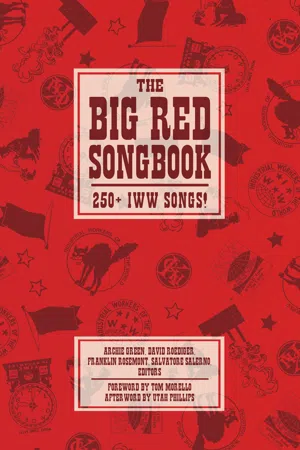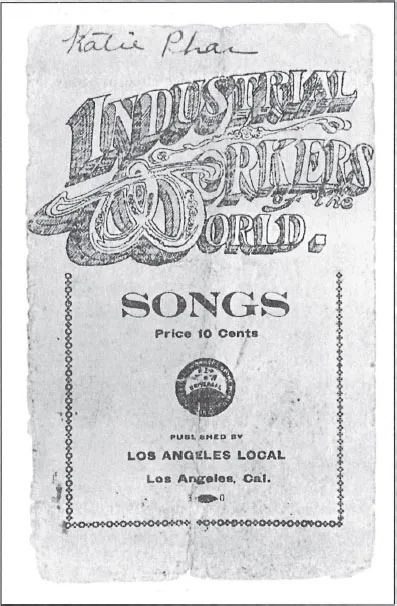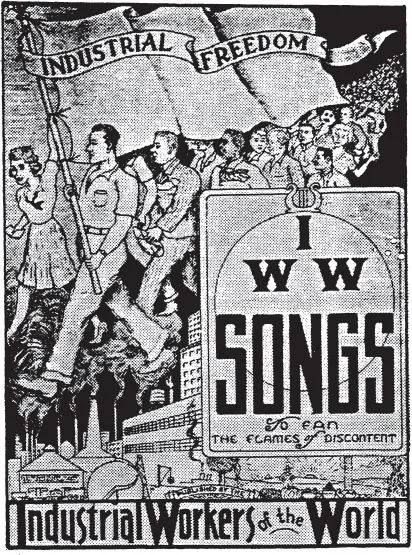
Big Red Songbook
250+ IWW Songs!
- 560 pages
- English
- ePUB (mobile friendly)
- Available on iOS & Android
Big Red Songbook
250+ IWW Songs!
About this book
In 1905, representatives from dozens of radical labor groups came together in Chicago to form One Big Union—the Industrial Workers of the World (IWW), known as the Wobblies. The union was a big presence in the labor movement, leading strikes, walkouts, and rallies across the nation. And everywhere its members went, they sang.
Their songs were sung in mining camps and textile mills, hobo jungles and flop houses, and anywhere workers might be recruited to the Wobblies' cause. The songs were published in a pocketsize tome called the Little Red Songbook, which was so successful that it's been published continuously since 1909. In The Big Red Songbook, the editors have gathered songs from over three dozen editions, plus additional songs, rare artwork, personal recollections, discographies, and more into one big all-embracing book.
IWW poets/composers strove to nurture revolutionary consciousness. Each piece, whether topical, hortatory, elegiac, or comic served to educate, agitate, and emancipate workers. A handful of Wobbly numbers have become classics, still sung by labor groups and folk singers. They include Joe Hill's sardonic "The Preacher and the Slave" (sometimes known by its famous phrase "Pie in the Sky") and Ralph Chaplin's "Solidarity Forever." Songs lost or found, sacred or irreverent, touted or neglected, serious or zany, singable or not, are here. The Wobblies and their friends have been singing for a century. May this comprehensive gathering simultaneously celebrate past battles and chart future goals.
In addition to the 250+ songs, writings are included from Archie Green, Franklin Rosemont, David Roediger, Salvatore Salerno, Judy Branfman, Richard Brazier, James Connell, Carlos Cortez, Bill Friedland, Virginia Martin, Harry McClintock, Fred Thompson, Adam Machado, and many more.
Frequently asked questions
- Essential is ideal for learners and professionals who enjoy exploring a wide range of subjects. Access the Essential Library with 800,000+ trusted titles and best-sellers across business, personal growth, and the humanities. Includes unlimited reading time and Standard Read Aloud voice.
- Complete: Perfect for advanced learners and researchers needing full, unrestricted access. Unlock 1.4M+ books across hundreds of subjects, including academic and specialized titles. The Complete Plan also includes advanced features like Premium Read Aloud and Research Assistant.
Please note we cannot support devices running on iOS 13 and Android 7 or earlier. Learn more about using the app.
Information
IWW SONGS


1. THE RED FLAG
James Connell
Table of contents
- Cover
- Title Page
- Dedication
- Copyright
- Contents
- Tom Morello: Foreword
- By Way of Introduction: On Wobblies & Their Songs
- All the Songs From the Iww Songbook: 1909–1973
- Other Iww Songs & Poems: Somehow Not Included in the Little Red Songbook
- Variants & Parodies: How Wobblies & Others Adapted and/or Updated Their Songs
- Songwriters Tell Their Stories
- History & Commentary: Diverse Reflections on the Wobbly Song Tradition
- Bibliography
- Adam Machado: Recorded I.W.W. Songs: A Working Discography
- Notes on Contributors
- Index